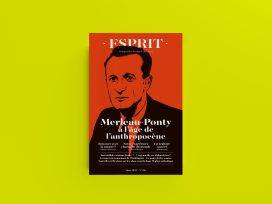Abstracts Esprit 1/2005
George Steiner
The hatred of books
In this article, the great reader-cum-critic George Steiner takes a paradoxical close look at those who sought the end of books, whether in the name of an alleged superiority of oral tradition, or under the influence of some Rousseau-like innocence or of revolutionary utopia. For all his fidelity to the pleasure of reading, the author is nonetheless well aware of the risks inherent to the scholar’s own inhuman lack of sensitivity whenever he/she lives only through books.
Michael Edwards
Laughing with Molière
Whenever Molière makes us laugh, commentators apparently think it is always out of a deep-running serious vein. But then should we think of him only as a genius when he reaches into the realm of “high comedy” where laughter does not belong? Another, so far overlooked perspective is possible, where far from emulating Alceste, his own character all-too bent on reforming other people’s mores, Molière laughs in an unfettered, wide-mouthed, deep-felt way that proves both generous and liberating.
Jérôme Tranb
Urban rehabilitation or how to put an end to social housing estates
The bill that reached France’s statute book in August 2003 and bears the name of the current social affairs minister, Jean-Louis Borloo, is an ambitious architectural programme. Can we expect this piece of legislation to restart a full-fledged social housing policy? So far, the perspectives opened up by early achievements are rather dim.
Patrick Weil
Unwrapping the scarf
A former member of France’s government-appointed committee on secularity, the author details the reasons that brought him to argue in favour of a statutory rule on the Islamic scarf, whereas he was initially hostile to this type of measure.
Joseph H. Carens
Democracy, cultural plurality and the hijab
In response to Patrick Veil’s article, this Canadian expert reviews four arguments in favour of the French statute. In the end and as he sees it, none of them are strong enough to warrant the limitation the law imposes on a civil liberty and which, on top of everything else, does not treat all confessions even-handedly.
Annie Daubenton
Ukraine and the myth of a country torn apart
During the recent electoral wrangle, one of the defining features of Ukraine has often been described as a gap between eastern and western regions that was so inherent as to prove impossible to bridge. Still, for all the differences between those regions, they do not overlap with two distinct, antagonistic Ukrainian identities. On the contrary, there is a near-unanimous craving for enhanced unity in the country.
Myroslav Marynovytch
Ukraine as a laboratory for ecumenism. An interview with Myroslav Marynovytch
Against Ukraine’s variegated cultural background, the relationships between the different Christian confessions are complex. A former dissident turned deputy provost of Ukraine’s Catholic University, Myroslav Marynovytch gives his views on the relationship between the Orthodox and Roman Catholic spheres.
Michaël Fssel
Flesh and society: On Luc Boltanski’s “The Ftal Condition” (“La Condition ftale”)
In his latest book, Luc Boltanski develops a sociology of engendering that takes the ambiguous status of abortion as its foundation. Having become legal without ever gaining legitimacy, abortion points to a blind spot in social relations which leads on to the inconsistencies inherent to human engendering. To what extent are such inconsistencies reflected in women’s actual experiences? This poses the whole question, both sociological and philosophical, of the way flesh and society relate to each other.
Luc Boltanski
The constraints and experiences of engendering. An interview with Luc Boltanski
As he sets his latest book in the context of his own previous publications, the author explains why he thought it useful to focus on engendering, as this experience sheds light on many other things, including our outlook on couples, individual choices and subjective rights. He also takes a close look at the meaning of his references to phenomenology (the late Michel Henry’s notion of “flesh”) and its implications for the liberal distinction between private and public.
Céline Lafontaine
French Theory and its American roots
People in France often wonder at the vogue of what, across the Atlantic, is known as French Theory, a collective name for an area of scholarship that includes structuralism, deconstruction or postmodernism. Looking through the other side of the lens, the author shows how all those currents are under the influence of cybernetic theory, one of America’s major intellectual contributions since 1945, and are all the better received in the USA as they have ended up embodying a number of notions and concerns that have been part of academic America’s ordinary diet for many years.
Michel Meslin
What victim for a single God?
Whereas social anthropology has always taken an interest in sacrifice as a theme and offered a string of antagonistic constructions, here a historian of religion reflects on its meaning and, in a comparative effort, sheds light on the meaning of sacrifice in the three major monotheist faiths.
Abdellah Hammoudi
Satan’s temptations and the stoning ritual
This excerpt from A Season in Mecca describes the stoning ritual, where the Muslim pilgrim throws stones at three headstones that symbolize Satan at the moment when, in a reversal of biblical roles, he orders Abraham out of sacrificing his son Ishmael as God had demanded.
Abdellah Hammoudi
A social anthropology of sacrifice, from the Higher Atlas to Mecca. An interview with Abdellah Hammoudi
A Season in Mecca follows up on a long-term uvre that began with La Victime et ses masques (The Victim and its Masks). Hammoudi launched his anthropological investigation in the Higher Atlas and extended it to the whole of Arab-Muslim society, with a characteristic distrust for any culturalist attitude. The book focuses on the ambivalent nature of sacrificial rites and the driving forces behind authoritarianism in both the western and eastern areas of northern Africa. This interview revisits the author’s successive steps along a path which implicitly makes it possible to understand how Islamic extremism (which only exacerbates prohibitions) is feeding on the crisis in grassroots Islam.
Hamit Bozarslan
Ernest Gellner, Clifford Geertz and Maghreb
From Jacques Berque to Jeanne Favret-Saada to Pierre Bourdieu to Fanny Colonna, the body of ethnological research on the Maghreb that is most familiar to French scholars dates back to the aftermath of colonialism. English-speaking contributions are yet to be discovered in France. The recent translations (a commendable endeavour by Bouchène, the publishers) of classics by Ernest Gellner and Clifford Geertz is as good an opportunity as any to discover them.
Published 12 January 2005
Original in French
Contributed by Esprit © Esprit
PDF/PRINTNewsletter
Subscribe to know what’s worth thinking about.



